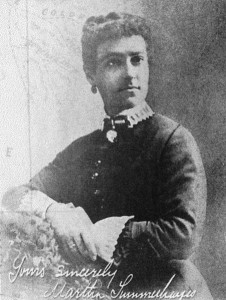
My father was deployed in Viet Nam when I was a little kid. I missed Dad more than anything and prayed hard every night that he would make it back to us. As a grown woman I understand, a little, that Dad’s absence weighed even heavier on Mom, on her own with four children and her husband in mortal danger — one of many “Army wives.” The Waiting Wives Club helped her through. I was too young to understand what support groups were about, but I’ve gleaned some sense of it from a book published over 100 years ago.
Martha Summerhayes’ memoir, Vanished Arizona: Recollections of the Army Life by a New England Woman, was a bestseller in 1911.
I have written this story of my army life at the urgent and ceaseless request of my children.… I have given simply the impressions made upon the mind of a young New England woman who left her comfortable home in the early seventies, to follow a second lieutenant into the wildest encampments of the American army.
The promise is delivered with adventure after adventure, vividly told, intensely felt, colored through and through by army life. As brave as any soldier, Martha doesn’t shy at describing physical prostration brought on by extreme heat and cold, disease, childbirth, bad water, and sometimes terror.
Her house is violently shaken by an earthquake “which tore and rent the baked earth apart”.
She witnesses a “weird procession”:
A man with a rude cross led the procession. Then came some Mexicans with violins and guitars. After the musicians, came the body of the deceased, wrapped in a white cloth, borne on a bier by friends, and followed by the little band of weeping women, with black ribosos folded about their heads. They did not use coffins at Ehrenberg, because they had none, I suppose. / The next day I asked Jack to walk to the grave-yard with me. He postponed it from day to day, but I insisted upon going. At last, he took me to see it. / There was no enclosure, but the bare, sloping, sandy place was sprinkled with graves, marked by heaps of stones, and in some instances by rude crosses of wood, some of which had been wrenched from their upright position by the fierce sand-storms. There was not a blade of grass, a tree, or a flower. I walked about among these graves, and close beside some of them I saw deep holes and whitnened bones. I was quite ignorant or unthinking, and asked what the holes were. / “It is where the coyotes and wolves come in the nights,” said Jack.
In a mountain pass haunted by hostile Apaches, her husband advises her, “You have your derringer; and when you see that there is no help for it, if they get away with the whole outfit, why, there’s only one thing to be done…. Don’t let them get either of you alive.”
Although she says, “I have not attempted to commemorate my husband’s brave career in the Civil War, as I was not married until some years after the close of that war, nor to describe the many Indian campaigns in which he took part,” Martha unintentionally comments on the traces her husband’s career left on him: his stoicism, his neglect of his wife’s and baby son’s needs — not callous, but clueless to the needs of mere (female and infant) civilians, his rigid adherence to the demands of the military. She also captures the eternal restlessness that military life on the move instills in troops and their dependents: you anticipate and sometimes dread, sometimes crave the next station.
More than anything, what got Martha through were other women, especially her fellow army wives.
There’s Mrs. Brayton:
Mrs. Brayton gave me a few more lessons in army house-keeping, and I could not have had a better teacher. I told her about Jack and the tinware; her bright eyes snapped, and she said: “Men think they know everything, but the truth is, they don’t know anything; you go right ahead and have all the tinware and other things; all you can get, in fact; and when the time comes to move, send Jack out of the house, get a soldier to come in and pack you up, and say nothing about it.” / “But the weight—” / “Fiddlesticks! They all say that; now you just not mind their talk, but take all you need, and it will get carried along, somehow.”
And Mrs Bailey, whose husband went missing:
I went into Mrs. Bailey’s tent. She was calm and altogether lovely, and said: “Charley can’t get lost, and unless something has happened to him, he will come in.” / Ella Bailey was a brave young army woman; she was an inspiration to the entire camp.
(Ella’s husband, luckily, was found.)
And Mrs. Aldritch:
The next morning we set out for Fort Whipple, making a long day’s march, and arriving late in the evening. The wife of the Quartermaster, a total stranger to me, received us, and before we had time to exchange the usual social platitudes, she gave one look at the baby, and put an end to any such attempts. “You have a sick child; give him to me;” then I told her some things, and she said: “I wonder he is alive.” Then she took him under her charge and declared we should not leave her house until he was well again. She understood all about nursing, and day by day, under her good care, and Doctor Henry Lippincott’s skilful treatment, I saw my baby brought back to life again. Can I ever forget Mrs. Aldrich’s blessed kindness?
I still don’t know much about Mom’s “Waiting Wives Club,” except that the women helped each other with advice, comfort and fellow feeling, much as did Martha Summerhayes and her fellow army wives in post-Civil War Arizona Territory.
Vanished Arizon at amazon (free kindle edition) | Vanished Arizona at Gutenberg.org